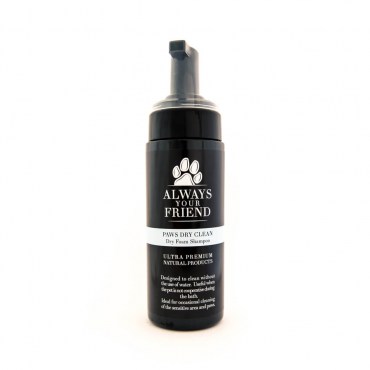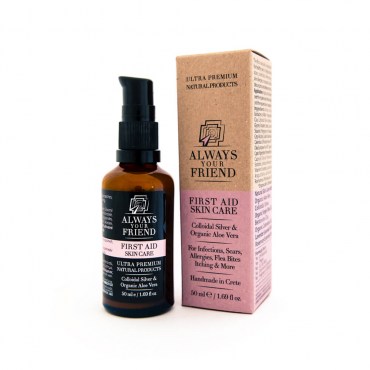Unfortunately, dogs develop extra health problems as they age. One of the issues the senior dogs may develop is dry skin or coat. Since dry skin can be itchy, you want to do what you can to help alleviate the symptoms. To help your dog, you can make changes to your dog's routine, such as picking a moisturizing shampoo. You can also encourage better nutrition to your dog's diet. Finally, you should talk to your vet, particularly if the changes came on suddenly.

1. Make sure any shampoo and conditioner you use are meant for dogs. If a shampoo that is formulated for human skin is used on a dog, the dog's acid mantle will be disrupted, creating an environment where bacteria, parasites, and viruses can run rampant.
2. Make sure to pick a good moisturizing shampoo or specifically designed for sensitive skin shampoo like Puppy Powder Shampoo & Conditioner. For your choice of shampoo, you should check to see if it has moisturizing ingredients like olive oil, aloe vera, jojoba oil.
3. For additional protection of the skin & coat, you can also use a good conditioner afterward to help decrease dryness. The Rejuvenation Pet Conditioner is using six essential oils to soothe and moisturize dry skin and coat while it restores the coat's health.
4. Avoid blow-drying your dog or use it gently. Blow drying your dog's coat only dries out the hair and skin. Instead, dry your dog off as well as possible with towels but make sure there is no moisture left on the pet.
5. When it's cold out, your senior dog may want to stay inside in the warmth more than it did when it was younger. You should encourage that behavior, as the cold air can contribute to dry skin.
6. Brush your dog's coat regularly. Brushing your dog's coat helps increase natural oil production from its skin. Older dogs do have more trouble producing oil, but this technique can still help to increase the oil in your dog's skin and coat.
7. Try adding flaxseed oil or freshly ground flax seeds to your dog's food. You can use 1/2 a teaspoon per every 7.5 kilograms of dog weight. That is, if your dog is 15 kilograms, you can use a teaspoon. Try this supplement twice a day.
8. Add olive or coconut oil to its diet. You can add as little as a couple of tablespoons a week or as much as 1 teaspoon per 5 kilograms of dog per day. It's best to start with smaller doses and work up to larger doses to see how it will affect your dog.
9. Watch for sudden changes. Gradual changes as your dog ages are not as much of a concern as a sudden change. A sudden change in your dog's coat or skin is much more likely to indicate a new disease or skin condition or allergy. While your dog will not likely develop allergies in old age if it hasn't earlier in life, allergies can worsen as your dog ages. More severe allergies can lead to drier skin or changes in the dog's coat. Talk to your vet about what can help with your dog's allergies if you suspect that's the cause.
10. Talk to your vet. While you may think it's just dry skin, flaky or scaly skin can be a sign of other conditions, such as mange, bacterial infections, Cushing's disease, and flea bite sensitivity, just to name a few. Therefore, it's always a good idea to get your dog checked out with a vet when you notice something like dry skin.








